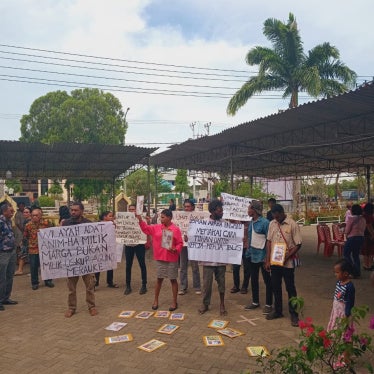(New York) - The United Nations Security Council should redouble efforts to prod Burma’s generals into starting a genuine political dialogue and ending human rights abuses, Human Rights Watch said today.
Burma’s military leaders have stonewalled visiting UN Special Envoy Ibrahim Gambari, making Security Council support for the upcoming visit of UN Special Rapporteur on the situation of human rights in Burma, Paulo Pinhiero, all the more urgent. The ruling State Peace and Development Council (SPDC) has yet to release political prisoners and protestors, end military rule, or even hold serious discussions with the political opposition.
“The military government has engaged in public relations stunts like allowing Gambari to be photographed with Aung San Suu Kyi, but it has failed to make a single meaningful move on national reconciliation or human rights protections,” said Brad Adams, Asia director at Human Rights Watch. “The government is clearly just trying to buy time in hopes that the world will turn its attention elsewhere. The UN must not accept this.”
Gambari, who concluded his visit yesterday, held meetings with government officials, but President Than Shwe refused to meet with him. According to Human Rights Watch sources, Gambari was not given any new information on the fate of hundreds of political detainees or detailed plans for the convening of a system of political dialogue.
Burma’s military government has shown contempt for the efforts of the United Nations to begin a process of serious political dialogue. On November 2, the day before Gambari’s visit, the SPDC expelled Charles Petrie, the UN Resident Coordinator in Burma, who had criticized the SPDC’s economic policies.
During his visit, Gambari met with detained opposition leader Aung San Suu Kyi, and helped to arrange a rare meeting today between Suu Kyi and four members of her political party, the National League for Democracy (NLD). However, this meeting was conducted in a government controlled guesthouse, which in all likelihood was bugged by Burmese intelligence services, inhibiting open discussion.
Human Rights Watch applauded the decision of Gambari to publicly release a letter written by Suu Kyi, in which she stated:
“I am committed to pursue the path of dialogue constructively and invite the Government and all relevant parties to join me in this spirit. I believe that stability, prosperity and democracy for my country, living at peace with itself and with full respect for human rights, offers the best prospect for my country to fully contribute to the development and stability of the region in close partnership with its neighbors and fellow ASEAN members, and to play a positive role as a respected member of the international community.”
Human Rights Watch called for the international community – in particular China, India, Russia, and Thailand – to offer its full political support for the impending visit of Paulo Pinheiro, the UN Special Rapporteur on the situation of human rights in Burma. Pinheiro, who plans to visit on November 11, has been refused entry to the country since late 2003. Pinheiro left the country in March 2003 after discovering a listening device under the table he was using to interview a political prisoner in Rangoon’s notorious Insein Prison. He had been promised private and confidential access to his interviewees.
“The government must accord Pinheiro full and unfettered access to detention facilities and account for all those detained and missing since the protests,” said Adams. “Anything less should lead to Security Council censure.”






